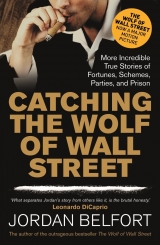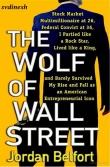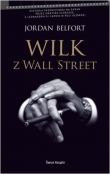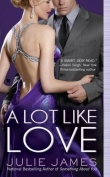
Текст книги "Catch the Wolf of Wall Street"
Автор книги: Jordan Belfort
Жанр:
Биографии и мемуары
сообщить о нарушении
Текущая страница: 27 (всего у книги 33 страниц)
CHAPTER 24
THE FATE GOD STRIKES BACK
 he next seven days were gut-wrenching.
he next seven days were gut-wrenching.
Upon hanging up with Magnum, I called Pat Mancini, who, not surprisingly, had just received a phone call from the Bastard, asking if he'd given me authorization to travel to Atlantic City. Pat, of course, told him that he hadn't, to which the Bastard suggested that he inform Judge Gleeson of my bail violation.
Pat told him that he would think about it.
Thankfully he told me that he wouldn't; in fact, he actually felt bad for me, he said. Yes, I was definitely a schmuck for taking a helicopter to Atlantic City, but in a way I had been set up for the fall. “There's only so long a man can stay under house arrest before he fucks up,” Pat explained. “It's like the old saying: You leave a man just enough rope to hang himself.”
Before he hung up the phone, he said something that I knew I would be hearing a lot for a few weeks, namely: “For a smart guy, Jordan, you do some pretty stupid things!” Then he hung up on me.
I passed the rest of the weekend in a state of relative calm. Then, on Monday morning, all hell broke loose.
It started when Mancini called Magnum to say that he had received a scathing letter from the Bastard, demanding that Pat write a letter to Gleeson, informing him of my trip to Atlantic City. And, just for good measure, the Bastard wrote that all the high points of my trip—the young girl, the bag of cash, the chopper-must be included in the letter to Gleeson, lest Pat be accused of painting a misleading picture for the judge.
Magnum placed an emergency phone call to Joel—to beg him to rescind the letter to Mancini—only to get a recorded message that went something like: “Hi, this is Joel Cohen, and I'm no longer with the U.S. Attorney's Office. I will be on vacation for the next two weeks…”
Yes, the Bastard had vanished, and this was his revenge.
He had wanted to revoke my bail over the Dave Beall incident but had been overruled. So this was payback, and it was a bitch!
Magnum, however, was not ready to go down without a fight, so he hopped on the subway and went down to the U.S. Attorney's Office to meet with Alonso, who agreed to call Mancini and tell him that he could handle this “in house.” My restrictions would be tightened for a few months, and then ultimately Alonso would make a motion before Gleeson to have my ankle bracelet removed—getting me out of Mancini's hair once and for all.
Sure, Mancini said, that would be wonderful. The only problem was that he had just hit the send button on the e-mail, and right now, at this very moment, Judge Gleeson was probably reading the letter, which did indeed include all the dirty details. When Magnum informed me of this, I dropped the phone, ran to the toilet, and vomited. Then I ran back to the phone and asked Magnum what this meant—which is to say, was my goose cooked for sure now?
He told me that it wasn't; there was still a fifty-fifty shot that Gleeson would read the letter and take no action. After all, the letter had not been accompanied by a request for a hearing. With a little bit of luck, Gleeson would just shake his head in disbelief, lose a bit of respect for me, and then move on with his day.
No such luck.
On Thursday morning, at 8:30 a.m. sharp, I heard a very disturbing sound: the phone ringing.
Oh, Jesus!I thought. I looked to my left, and there was KGB. As always, she was sleeping soundly, her blond Soviet head poking out from beneath the white silk comforter.
It was Magnum. His first few words were lost on me, but his next few words weren't: “Unfortunately, I just received a fax from Gleeson, and he's ordered a hearing.”
“When?” I asked, in a state far beyond panic.
“Tomorrow morning, ten a.m.”
I stole a glance at KGB. Well, it was nice knowing you! I thought.
“I guess I'm dead fucking meat,” I said rather calmly.
“Not necessarily,” he replied. “I think there's still a way out of this. The key is that we need to approach Gleeson as a united front. I already spoke to both Mancini and Alonso. Mancini will be there too, tomorrow, and he promised he'd stand up for you. He's gonna say that it was a misunderstanding and that, in hismind, you can still be trusted to live up to your bail restrictions.”
“And what about Alonso? What's he gonna say?”
“Like I told you, when it comes to AUSAs, Dan Alonso is about as good as they get. So, in spite of him never meeting you before, he's willing to stand up for you too. I'm meeting with him later today, and we're going to work out a package that we can sell to Gleeson. There'll be some severe restrictions for a while—no travel, in your house by six p.m., no more late nights in the city—but it's much better than going to jail right now, right?”
“Yeah, it is,” I replied. “And what are the chances of Gleeson going along with this?”
“Close to a hundred percent,” Magnum said confidently. “It's very rare that a judge goes against the recommendation of the U.S. attorney. And the fact that Mancini's on board pretty much seals the deal.”
Excellent, I thought. There was no reason to worry.
The United States Courthouse at 225 Cadman Plaza was enveloped by an irreducible despair. No one, it seemed, really wanted to be there—from the lawyers, to the defendants, to the clerks, to the marshals, to the court reporters, to the people who swept the building's six sprawling floors, to the judges themselves. Everyone looked either bored, desperate, or on the verge of tears. And while you might find an occasional smile from someone who had just been acquitted of a criminal charge, for every broad smile there was a frown. After all, for every winner there was a loser.
Except in my case.
It was Friday morning, a few minutes before ten, and my lawyers and I were standing in a long, broad hallway outside Judge Gleeson's courtroom. Save a few wooden benches against the walls, the hallway was completely bare. The benches looked about as comfortable as the linoleum floor. Between the benches were four soundproof doors, two on each side, and each leading into a separate courtroom.
Just then Magnum looked down at the top of my head and said, “Look, here comes Alonso now,” and he pointed to a tall, slender figure walking toward us. At first glance he looked more like a movie star than an assistant United States attorney. Tall, lean, good-looking, immaculately groomed, and possessing a surprisingly warm smile, he was everything the Bastard wasn't—namely, a picture of grace and gentility. He looked like the actor George Hamilton, without the tan.
“So you're Jordan Belfort,” said Dan Alonso, extending his hand for a shake. “You don't look capable of causing so much commotion!”
I smiled and shook his hand warmly, wondering if he was making some vague reference to my height. After all, he was every bit of six foot two, and Magnum's head was nearly scraping the twelve-foot-high cement ceiling. I took a step toward the Yale-man, for height-protection, and I said, “Well, looks can be deceiving, right?”
Alonso nodded and shook my hand firmly.
Magnum said, “I promise you, Alonso, this is the end of the commotion. Jordan has lost his desire to fly around in helicopters with bags of money. Right, Jordan?”
And don't forget about the underage girl, I thought. “Forever,” I said confidently. “I will never step foot in Atlantic City again. In fact, I have no desire to ever step foot in New Jerseyagain!”
“Who does?” reasoned the Yale-man.
Magnum said to Alonso, “I think this would be a good time to go through the particulars. I've already spoken to Jordan about his new restrictions, and he's totally fine with them. Right, Jordan?”
“Yeah,” I said unenthusiastically. “I'm actually looking forward to them.”
Alonso said, “Just behave yourself for a few months and we can go back in front of Gleeson and make a motion to have you taken off house arrest. I think that's the safest bet for all of us.”
I compressed my lips and nodded humbly, but silently I was thinking: Alonso is the fucking best, and may the Bastard burn in fucking hell, with a pitchfork up his ass! “Thank you,” I said meekly.
“No problem,” said Alonso. Then he looked at Magnum and said, “I'd just as soon not bring up the Dave Beall issue today. We'll set up another hearing for that.”
Magnum nodded, and then looked down at me and said, “Dan has been nice enough to reduce the obstruction-of-justice charge to lying to a federal officer.”
Alonso, sarcastically: “You can thank your lawyers for that one. They've been pounding me so hard over the last few days– especially you, Nick—that I just didn't want to hear their voices anymore.”
“Just doing my job,” said the Yale-man.
I smiled at Magnum and the Yale-man. I said to Alonso, “I appreciate it, but, above all, I know my kids will appreciate it one day.”
Alonso nodded in understanding. “All right, well, let's go inside and get it over with.” He took one step, then stopped dead in his tracks. He turned to us and said, “I sincerely hope Gleeson doesn't ask too many questions today, ‘cause, for the life of me, I haven't the slightest idea what really happened here. This whole thing got dumped on my lap at the last second, and I really hate to go to court not knowing all the details. I mean, why the fuck would you go to Atlantic City in the first place? You were under house arrest, for Chrissake!”
I nodded sheepishly. “Well, I think I was just—”
Alonso cut me off with a raised hand. “No, don't tell me. I'd rather not know. There's no upside in it.” He shook his head. “Anyway, for a smart guy you do some pretty stupid things, you know?”
I nodded in agreement. “Yeah, I've heard that before.”
“Yeah, well, I'm not surprised. Come on, let's go.”
“Hear ye! Hear ye!” bellowed a kind-looking middle-aged woman wearing a nondescript maroon pantsuit. “The United States Court for the Eastern District of New York is now in session,” she continued, in a surprisingly deep voice. “All rise for the presiding judge, the Honorable John Gleeson.”
Like a magician, Judge Gleeson, in black robes, emerged from behind a wood-paneled door that led from his chambers into the courtroom. Without saying a word, he calmly walked up a short flight of stairs and took a seat behind a vast wooden desk that sat upon a wooden stage fit for the Phantom of the Opera himself.
To the judge's left, a court reporter took her seat in anticipation of memorializing the day's proceedings. Behind her stood a very stocky man, who was wearing a loose-fitting blue sport jacket with a giant bulge under his left armpit. He was just standing there, his arms crossed beneath his massive chest, waiting for someone to fuck with the judge. Then he would strike with the speed of a cobra.
The rest of us—including my pretrial services officer, Patrick Mancini, who at six-three, two-thirty could have played tight end for the Rams—were all standing behind the defense table. That was a good sign, I figured, because there was no one standing behind the prosecutor's table. (We're all on the same side here!) In fact, even the audience's sole spectator, a young black woman in her early twenties, whom I'd pegged as an aspiring lawyer or a reporter, looked to be on my side. She was sitting in the spectator section, holding a spiral notebook and a pen.
Magnum put his hand on my shoulder and gently pushed me into my seat. Now the kind woman who'd announced the judge's presence began muttering something to the court reporter, something about the entire United States of America being against me, Jordan Belfort. I had never really looked at it that way before, even at my sentencing, which had occurred in secret, inside Judge Gleeson's chambers.
Judge Gleeson looked rather nice, actually. Even in those flowing black robes, I could still tell that he had a kind heart. He struck me as the sort of guy who would carve a Thanksgiving turkey for his family. He was very young for a federal judge, no older than forty-five, and he had a reputation for brilliance. Hopefully he was in a good mood.
Suddenly Magnum motioned for me to stand, so I did.
“Okay,” Judge Gleeson said softly. “Now, what's going on here?”
Alonso said, “If it pleases the court, Your Honor, I'd like to speak.”
Judge Gleeson nodded.
“Thank you,” said Alonso. “Okay, Your Honor, well, we've come to an agreement with the defendant's counsel on this matter, as well as with Mr. Mancini. The agreement consists of tightening the defendant's house-arrest restrictions to very onerous terms. The defendant will only be able to travel to work and back, and he must be home by six p.m., without exception. And on weekends, he will be on twenty-four-hour lockdown.” With that Alonso nodded once, pleased with my new conditions.
“Oh, really?”snapped Judge Gleeson. “Well, I have questions.”
And that was it; it was over before it started.
Gleeson had questions and Alonso didn't have answers, because he had just taken over the case. And even if he did haveanswers, it wouldn't have mattered anyway, because, as Magnum had said, this was justthe sort of thing to raise Gleeson's ire—the very brazenness of it!
Suddenly I realized that Alonso was babbling something about a helicopter… a bag of cash… then an unidentified female (and, obviously, every last soul in the courtroom, especially Gleeson, knew exactly what kind of female this was), and then he started saying, “… but I really don't know all the facts here, Your Honor, because I just—”
Gleeson cut him off in a menacing voice: “Are you telling me that you've come into my courtroom unprepared, that you don't know the first thing about this case?”
I snuck a peek at Alonso, who looked like he'd just taken a bullet. The way I figured it, he had two options: The first was to blame it all on the Bastard, and the second was just to say that he was sorry and that it wouldn't happen again. Alonso said, “I'm very sorry, Your Honor, it won't happen again.”
Now it was Mancini's turn. “Mr. Mancini?” said the angry judge.
Pat fumbled through some notes and began spewing out random facts, then a few contradictions, and he ended by saying, “… uh, but in spite of all that, I still think Mr. Belfort can be trusted to live up to his new release conditions.” He shrugged, as if to say, “But that's just one man's opinion. Don't hold me to it.”
Gleeson didn't berate him. In fact, he didn't say a single word to him; he just stared at Mancini for a few seconds too long, his eyes emitting what appeared to be an incredible shrinking ray, and I watched in fascination as Mancini, the tight end, seemed to grow smaller and smaller, until he was a midget.
Satisfied with that, Gleeson turned off his shrinking ray and then looked at his old buddy Magnum. “Does the defense counsel have anything to add here?”
Magnum stood up to his full height and said, in a very confident tone, “Yes, Your Honor…” and then he went about giving a highly accurate account of what happened. His words came out smoothly, confidently, and altogether logically—which was a total fucking disaster for me, because this was not one of those situations where the truth shall set you free,especially when Magnum got to the part about the helicopter malfunction being the primary cause of me not getting back before curfew. That was when Gleeson pounced.
“So, what you're saying, Counselor, is that your client's excuse is that he thought he'd get away with it?”
“Uh, not exactly,” said Magnum—and Jesus Christ!I thought. How the fuck could a judge who'd never broken a single law in his entire life sift through all the bullshit so quickly? What were the chances?
Now Magnum began trying to defend me again, spewing out more half-truths and some rather bold predictions (considering my track record) about my future conduct under house arrest. But I couldn't listen anymore. I knew where this was going, and I knew where /was going. And it wasn't home.
Finally there were a few moments of silence. I fought the urge to turn around and sneak a peek at my favorite spectator. She thought she would be sitting through a boring hearing, and now she was about to see a guy who had put up $10 million in bail have it revoked!
Gleeson started talking, and I knew that he was speaking English words, but for some reason I couldn't understand them. He sounded like the muffled teacher from the Charlie Browncartoons .I felt dizzy, ready to puke. The room seemed to be slowly revolving, like a merry-go-round.
Then I heard Gleeson say, “No… no… I don't like this… get to the bottom of this… blatant disregard… helicopter… where… did he get cash…” Then suddenly more Charlie Brown: “Weep, womp… Womp, weep… Weep, womp…”and then: “I hereby remand the defendant to custody.” Next thing I knew, Magnum was saying, “Give me your watch and your money, and your belt too.”
I had only a few seconds of freedom left, and my mind immediately jumped to the kids. I was supposed to pick them up this afternoon. Such sadness.I had let them down again. As I removed my watch, I said to Magnum in an urgent tone, “You gotta call Nadine right now and tell her what happened. Tell her that I don't know when I'll be able to call, but to kiss the kids for me and tell them that I love them. And that I'll always love them.”
“I'll take care of it right away,” he said. “I'm sorry this happened.”
“Not as sorry as me,” I said softly. “Is there any way out of this?”
He shook his head. “Not now; we need to let Gleeson calm down for a while. A longwhile.”
“How long is a long while?” I asked.
“At least a few months, probably longer.”
In no time flat, the man with the bulge under his jacket was standing next to me. Rather kindly, he said, “Would you mind coming with me, sir?”
“Do I have a choice?” I asked, with a nervous smile.
“I'm afraid not,” he replied, and he put his beefy hand on my shoulder and gently guided me in the direction of a secret door at the front of the courtroom.
I took a few steps, then turned to Magnum and said, “Oh, shit! You gotta call Yulia! She's at the Four Seasons Hotel. I told her I'd be back in an hour.”
“I'll take care of it,” he said calmly. “As soon as I'm done with Nadine.”
“The room's under my name,” I screamed over my shoulder.
And then I was gone—walking through a door and finding myself in a little-known area of 225 Cadman Plaza, consisting of holding cells, fluorescent lights, and desperate people. The area didn't have a name, but I had been here once before and nearly frozen to death. Now I was back.
As usual, I had no one to blame but myself.
CHAPTER 25
THE INEVITABLE
 he Metropolitan Detention Center rose up nine stories from out of the gloomy groin of Brooklyn, a foreboding place that passing motorists pointed to and cringed at. Some two miles south of the federal courthouse, the building, with its towering razor-wire fence and sweeping searchlights, occupied an entire square city block, sucking out the very life force from the air surrounding it.
he Metropolitan Detention Center rose up nine stories from out of the gloomy groin of Brooklyn, a foreboding place that passing motorists pointed to and cringed at. Some two miles south of the federal courthouse, the building, with its towering razor-wire fence and sweeping searchlights, occupied an entire square city block, sucking out the very life force from the air surrounding it.
The marshals had taken their sweet-ass time shuttling me over here; from holding cell to holding cell, from cement hallway to cement hallway, from prison van to prisoner loading dock, I was herded, handcuffed, and shackled, like a cow, and all the while, whether by design or by accident, the average room temperature never exceeded the surface temperature of Pluto.
But now the worst was over.
Stripped of my clothing and my dignity, and then ordered to lift up my schlongand nut-sack and bend over and cough, I had arrived in style—that is to say, I was now in a windowless, partitionless, hopeless room known as “Pod 7N,” which was on the seventh floor on the north side of the building. I was now sitting on the edge of my razor-thin mattress, engaged in a conversation with my new “bunkie,” Ming, who was sitting beside me. Alas for Ming: Despite being a thirty-year-old Chinaman, he looked like a sixty-year-old ghost.
“So let me get this straight,” I said skeptically. “You haven't seen the sun in six years? I find that a little bit hard to believe, Ming.”
Ming shrugged his narrow shoulders, which were connected to a series of equally narrow body parts. He said, in heavily accented English, “Not six year, six and one-halfyear. Judge say I flight risk, so he no give bail.”
“That sucks!” I muttered. “So we never get to go outside?”
Ming shook his head no. “Just this room. Do all here.”
Christ,it seemed only logical that, since a plant needs sunlight to survive, a human being would too, didn't it? Apparently not. With a sinking heart, I took a moment to regard the room. It was a vast space, perhaps forty by eighty feet, packed to capacity with 106 inmates—or detainees,as the phrase went—all living barracks-style, doing everything from eating to sleeping to pissing to shitting to showering to brushing their teeth for months or sometimes yearson end beneath a sea of buzzing fluorescent lights. Without a partition in sight, I could see from one end of the pod clear to the other.
Not that there was much to see—simply a vast sea of metal bunk beds and low-backed plastic chairs bounded at the rear by six gruesome toilets and three germ-laden showers. At the center of the room were two dozen stainless-steel picnic tables, a falling-apart Ping-Pong table, a sometimes-working microwave oven, an ancient toaster oven, and three color TVs suspended from the ceiling. Other than at mealtimes, the picnic tables were used for either watching TV (with headphones on) or for playing chess, checkers, cards, or, if you were a Dominican, a jailhouse version of dominoes, which required you to smash the dominoes onto the table while muttering strings of broken-Spanish curses.
And that was all Pod 7N had to offer—unless you included, as one must, the three pay phones affixed to a cement wall up by the guard station, where a single corrections officer now sat behind a cheap wooden desk with his finger on a panic button. The pay phones were the pod's highlight, a place where detainees,most of them blacks or Hispanics (less than ten percent were white or Asian), would try to stay vaguely connected to the outside world. From morning ‘til night, lined up six deep, they waited to speak to their loved ones, who, for the most part, were loving them less and less with each passing day. My particular bunk was located by the pay phones.
So here I was, sitting with Ming, trying to make sense of it all.
He was blessed with a generous smile, an altogether kindsmile. It was hard to imagine that he was a heroin dealer for the Chinese mob, a pint-size enforcer who had once lit a competitor on fire and then used his burning carcass to roast spareribs.
“What's the story with the phones?” I asked Ming the Merciless.
“Collect calls only,” he answered.
Just then, three detainees came scurrying by, single file. They were rotating their hips awkwardly and swinging their arms in an exaggerated fashion. Speed-walkers, I reasoned. Like everyone else, they wore gray sweatpants, white T-shirts, white canvas sneakers, and headphones. Ming and I leaned forward and watched them grow smaller in the distance. I motioned toward the speed-walkers. “What are they doing?”
Ming shrugged. “They exercise. Walk circles all day. Pass time.”
Interesting, I thought.
In fact, despite arriving in Pod 7N only five minutes ago, I had already come to the conclusion that my chief enemy was not the other detainees but the intense boredom of being detained. After all, unlike a federal prison, where activities are abundant and violence is rampant, a federal detention center is devoid of both activity and violence. They simply bore you to death.
“So there are never any fights here?” I asked Ming.
He shook his narrow head. “Everyone too scared. You face ten year, have fight, now you face twenty. Understand?”
I nodded. Ninety percent of the detainees were awaiting sentencing, so if they got into a fight or otherwise fucked up, the Bureau of Prisons could alert the sentencing judge, who could then sentence them at the high end of the guidelines. “I need to use the phone,” I said tonelessly, rising from the edge of the mattress.
Ming put his hand on my arm. “Hey, you rich guy, right?”
I looked down at him and shrugged. “Why?”
He smiled. “Cause Ming do everything for you: cook, clean, wash clothes, make bed, cut hair. I be like slave.”
I stared at him for a moment in disbelief. “How much?”
“Twenty dollars a week. You pay in stamps from commissary. Give me extra ten dollars, I steal food from kitchen. We eat like kings. I make best orange chicken this side of Chinatown!”
I chuckled. “Sure,” I muttered, “why not?” And I headed for the back of the line.
My first call was to Magnum's home, which, sadly enough, was a number I knew by heart. The news was not good. Alonso was on the warpath: not so much because he was mad at me but because he was mad at the situation and, most of all, he was mad at himself. He had walked into a courtroom unprepared and had paid the price for it. As a consequence, it would be many months before he would go back on my behalf. On top of that, the burden would now be on us to do the investigation—to get affidavits from the pit bosses and casino hosts and the helicopter pilots, as well as Kiley, if I could find her—to prove beyond the shadow of a doubt that my trip to Atlantic City had nothing to do with money laundering.
Magnum had already enlisted Bo, who was reaching out to his contacts in Atlantic City. Coleman agreed to help too, although Magnum thought it would be best if we did our own investigation, then presented the facts to Gleeson in the form of an affidavit; this way the judge would know we were serious.
Before I hung up the phone, I found myself doing what all detainees did: I begged my lawyer not to give up on me. “No matter what happens,” I said to Magnum, with my hand cupped over the mouthpiece, “don't stop trying to get me out of here. I don't care how long it takes or how much it costs.”
“I wouldn't stop for any client,” he said warmly, “especially not you. Just hang in there a few months. I'll get you out, buddy.”
I breathed a sigh of relief. “Were you able to get in touch with Nadine?”
“Yeah, she's fine. Maybe toofine, if you know what I mean.”
“I do,” I said gravely. “She's been praying for something like this to happen. It's all the excuse she needs to bolt to California. Did she ask you how long I'd be in for?”
“No, and I didn't bring it up, for that very reason. But I told her to accept collect calls from you, and she promised that she would.”
Well, that's the least she could fucking do!“And what about Yulia?” I asked with a smirk. “She's probably back with her ex-boyfriend by now.”
“I highly doubt that,” said Magnum.
“Oh, yeah? Why is that?”
“Well, if she's anywhere, she's probably in her psychiatrist's office.”
“What are you talking about? What happened to her?”
“What happenedto her is that she totally flipped out on me! I called her at the hotel, like you said, and when I told her you got remanded—or, should I say, got taken to jail, because she didn't know what remandedmeant—she completely lost it. She started crying hysterically on the phone, and she kept saying, ‘OhmyGods! OhmyGods!’ which, I admit, I found a bit humorous, because she kept using the plural form of God.”
“Yeah,” I said proudly, “she has a tendency to do that.” Suddenly I found KGB's language deficiencies rather heartwarming. “What else did she say?”
“I'm not really sure, because she started speaking in Russian, a mile a minute. Anyway, she's a verybeautiful girl. I can see why they made her Miss Soviet Union.”
“Wait a second: You sawher?”
“Yeah, she showed up at my office unannounced; I guess she must have called information. Anyway, she was shaking uncontrollably. It was pretty scary, actually. Nick was about to call a doctor, but then some guy named Igor showed up and took her away. Do you know who Igor is?”
A shock!“You met Igor?” I felt a twinge of jealousy. Why did Magnum get to meet Igor before I did? Whatever. Curiosity overpowered jealousy, and I said, “What does he look like?”
“Pretty average,” replied Magnum. “Tall, thin, silver hair; about fifty or so. He's very suspicious-looking, like a fox. He has excellent posture.”
“What do you mean, he has excellent posture?”
“I mean,he has excellent posture! The guy stands as stiff as a ramrod. He was probably in the military once.” A brief pause, then: “He probably still is, if you catch my drift.”
There were a few moments of silence as the very obviousness of Magnum's words hung in the air. Then he said, “Anyway, he left a very cryptic message for you—something about you being under his protection now. I have no idea what he meant by that. Do you?”
Under Igor's protection?What was that crazy Russian bastard talking about? “No,” I replied, “I have no idea. I never even metthe guy!”
“Interesting,” said Magnum. “Well, Yulia left you a message too, although it was a bit less cryptic.”
I perked up: “Oh, really? What did she say?”
With a chuckle: “She say she loveyou and she wait as long as it take,even if it takeforever.” More chuckles at KGB's grammar. “I think she was very sincere.”
We exchanged a warm good-bye, then I hung up the phone and headed to the back of the line. There were four people ahead of me, so I had a few minutes to think. Above all, I was astonished at KGB's loyalty. I would have never guessed it, especially after my experience with the Duchess. I had just assumedthat KGB would fly the coop, because that's what the Duchess had done. But, now that I thought about it, KGB's attitude wasn't so astonishing.
Few women would abandon their husbands on the courthouse steps. What the Duchess had done was unconscionable. I knew that I would think that forever. I no longer cared, though, because I was in love with someone else. Where once I had felt betrayed and heartbroken, I now felt angry and apathetic. And, in truth, I wasn't even that angry. I just wanted my kids to remain east of the Mississippi.
The line moved quickly, and my conversation with the Duchess moved even quicker. Magnum had already given her the low-down, and I filled in the missing blanks. Interestingly enough, Magnum had played down the helicopter aspect of the debacle, focusing instead on what had happened with Dave Beall and how it set the stage for the Bastard's revenge. I made a mental note to thank Magnum for that.








